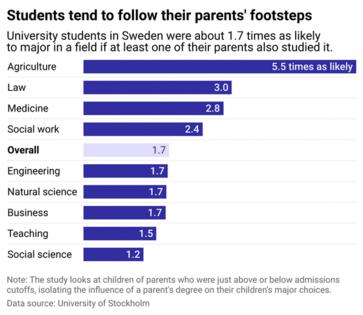When it comes to choosing a college major, how much influence do parents have on students?
Published in Slideshow World
Subscribe
When it comes to choosing a college major, how much influence do parents have on students?
From former presidents and famous movie stars to accomplished engineers and lawyers, it is not uncommon for children to choose the same career as their parents. Even Dwayne "The Rock" Johnson followed in his father's footsteps as a professional wrestler after a stint in the Canadian Football League and a slew of injuries that cut short his path to football stardom.
But does following in a parent's footsteps speak to the importance of parental influence and involvement, or the value of role models more generally?"Kids look to their parents for advice and help," Madison J. Freeman III, a school counselor at Kalamazoo Public Schools in Michigan, told Stacker. "It's the natural thing to do."
Learner looked at academic research to determine how much influence parents can have on their children's choice of college majors.
"Students understand that college is a life-changing decision, and they want to choose the best campus and major," said Freeman, adding that for such a big decision, incoming freshmen often turn to or model their future after their parents.
Americans are on average twice as likely to work in a particular job if one of their parents was also employed in that occupation, according to a 2017 analysis by The New York Times. However, this effect is particularly notable in certain highly specific occupations. For instance, women are 362 times more likely to work as fishers if their fathers also did; similarly, women were 281 times more likely to become military officers if their mothers were.
Researchers posited that both financial and human capital—the skills, experiences, and insights people accumulate over the course of a career—factor into their career decisions. In other words, exposure to a career because of a parent's experience often adds value, whether it is practical knowledge or a sense of curiosity about the field.
However, parental influence is not always top of mind. A 2022 Undergraduate Experience Survey conducted across the entire University of California system asked respondents to choose which factors were most important in deciding their major, allowing them to select all that applied. Only 16% of students chose "parental/family desires," compared to the most-selected factors, "intellectual curiosity" (almost 9 in 10) and "prepares me for a fulfilling career" (7 in 10). Nearly half of the respondents selected "leads to a high-paying job."
But that does not mean children do not absorb the outcomes and values inherent in their parents' choices. Freeman said parents' experiences and lifestyles also help shape a student's choice of major, even if merely indirectly. A parent with a high-paying job, such as a doctor, might unknowingly encourage their child to follow the same path. A parent with a fulfilling career as an educator might consequently do the same.
Visit thestacker.com for similar lists and stories.
Specialized degrees tend to run in families
Most recently, parental influence on college majors was examined in a 2024 working paper by Adam Altmejd, a researcher at the Swedish Institute for Social Research at Stockholm University. Using data for people who applied to Swedish universities between 1977 and 1992, as well as data for their children, the study revealed that 3 out of 4 students were more likely to graduate from a particular field if one of their parents did.
By focusing on parents who were just barely admitted into their fields versus those who just barely missed the cutoffs, the study helps isolate the impact of a particular parent's degree on a student's choice of major while controlling for factors such as family background or wealth. In other words, the study found that people majoring in fields such as engineering are likelier to do so because one of their parents has an engineering degree, rather than just coming from a mathematically inclined family.
This method also controls for other factors like family background or wealth.
The study also found that parents are especially influential when it comes to specialized fields. For instance, Swedish students were more than five times as likely to study agriculture if at least one of their parents did, as compared to other students. In contrast, students were only 1.2 times as likely to study social science, a much more general major, if at least one of their parents did.
Parents of the same gender as their child had a more significant impact on their career choice, the study found. Fathers have a particularly strong influence on their sons, while mothers exert a greater influence on their daughters. In male-dominated fields, a mother's profession significantly influences her daughter's professional outcome. For instance, young women whose mothers were engineers are more likely to go into engineering despite it being a male-dominated field, according to the study. That is, parents can positively influence their children as role models, particularly in "gender incongruent" fields.
The Stockholm University study provides a lesson for policymakers hoping to improve social mobility. While parents, consciously or not, can steer their children in a particular direction, role models generally have a profound impact on the young people in their lives, especially if those role models come from similar backgrounds.
A 2021 study by researchers at New York University found that the most effective role models tend to reflect a student's identity. Adults who serve as exemplars for students tend to share the same race or ethnicity or psychological similarities, such as struggles, preferences, and values, with the students who look up to them.
Freeman encourages students to "explore and make the best decision for themselves." Choosing a major based on their parents' profession can be limiting. He said there are students who trust their parents to tell them what to do and, in some cases, make the decision for them. "This can be very limiting and restrictive when college is supposed to be the opposite in many ways," he said. "It takes the experiential aspect of college for a young adult out of the equation."
Additional reporting by Kelly Glass. Story editing by Alizah Salario. Copy editing by Sofía Jarrín. Photo selection by Lacy Kerrick.
This story originally appeared on Learner and was produced and distributed in partnership with Stacker Studio.








Comments